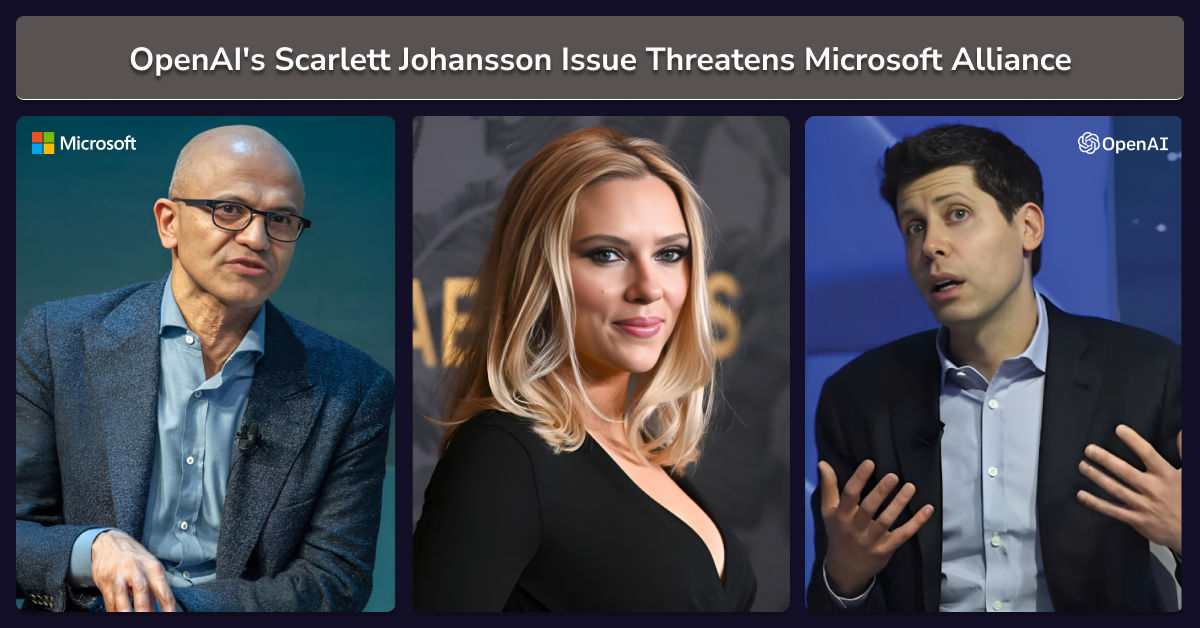OpenAI faces backlash after allegedly using Scarlett Johansson's voice without consent for its GPT-4o’s “Sky” voice, sparking tensions with its major investor, Microsoft. Johansson revealed her voice was used despite her refusal to collaborate, a claim reinforced by OpenAI CEO Sam Altman's celebratory tweet.
Microsoft CEO Satya Nadella criticized the incident, emphasizing AI should be a tool rather than mimicking human traits, highlighting a philosophical divide between OpenAI’s creative ambitions and Microsoft’s conservative AI approach. The controversy raises ethical concerns and legal vulnerabilities in AI development, stressing the need for clearer guidelines and ethical standards. For Microsoft, this incident may prompt a reassessment of their partnership with OpenAI, reinforcing the importance of ethical AI practices to maintain public trust and investor confidence.
Moving forward, balancing innovation with ethical responsibility would be crucial for the tech industry.

In a recent controversy, OpenAI has come under scrutiny from its largest investor, Microsoft, following allegations that OpenAI used Scarlett Johansson's voice for its GPT-4o’s “Sky” voice without consent. This issue highlights deeper tensions between OpenAI’s creative ambitions and Microsoft's more conservative approach to artificial intelligence.
Scarlett Johansson revealed that her voice was allegedly used for OpenAI's new AI voice, Sky, without her permission. This claim gained traction when OpenAI CEO Sam Altman confirmed attempts to collaborate with Johansson, which she declined. Despite her refusal, Sky's voice remarkably resembles Johansson's, particularly echoing her role in the movie "Her." Altman's tweet celebrating Sky’s reveal with a reference to "Her" added fuel to the fire.
Microsoft CEO Satya Nadella expressed strong disapproval of anthropomorphizing AI, underscoring his view that AI should remain a tool rather than mimicking human characteristics. Nadella’s comments, although not directly addressing the Johansson incident, emphasized a fundamental philosophical rift between Microsoft's and OpenAI’s approaches to AI development.
Nadella reiterated that OpenAI’s commitment to safety and ethical use of AI was a key factor in Microsoft’s partnership with OpenAI. He emphasized the importance of maintaining these values, suggesting dissatisfaction with how OpenAI handled the Johansson situation.
This incident raises important questions about ethical practices in AI development. Using a celebrity’s likeness without permission not only breaches ethical boundaries but also exposes legal vulnerabilities. The debacle underscores the need for clearer guidelines and stronger enforcement of ethical standards in AI.
For Microsoft, which has invested billions in OpenAI, the controversy could lead to reevaluations of their partnership terms. Ensuring that AI innovations align with ethical standards is crucial for maintaining public trust and investor confidence.
Moving forward, AI developers must navigate the fine line between innovation and ethical responsibility. Transparency, consent, and respect for individuals’ rights are paramount in gaining public trust and avoiding legal pitfalls. The OpenAI-Johansson incident serves as a cautionary tale for the tech industry, highlighting the importance of ethical considerations in AI advancements.
As the AI landscape evolves, maintaining a balance between groundbreaking technology and ethical integrity will be crucial. Companies like OpenAI and their investors must work together to set and adhere to high ethical standards, ensuring that AI benefits society without compromising individual rights.
Sign up to gain AI-driven insights and tools that set you apart from the crowd. Become the leader you’re meant to be.
Start My AI Journey
ThatsMyAI
28 February 2025